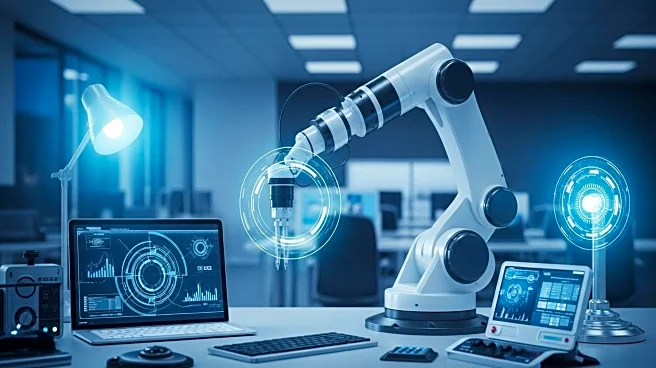What's Happening?
Salesforce has announced the reduction of approximately 4,000 customer support roles, as revealed by CEO Marc Benioff. This decision is part of a broader strategy to integrate artificial intelligence (AI) into the company's operations, significantly transforming its workforce dynamics. Benioff stated that AI now handles up to 50% of workloads at Salesforce, reducing the need for human intervention. The company has implemented AI-powered customer service bots through its 'Agentforce' initiative, which has led to a decrease in support cases and the need for human support staff. This move reflects a growing trend among tech companies to leverage AI for operational efficiency.
Why It's Important?
The reduction in workforce at Salesforce highlights the profound impact of AI on employment within the tech industry. As AI continues to advance, it is reshaping job markets by automating tasks traditionally performed by humans. This shift poses challenges for employees and job seekers, who must adapt by acquiring new skills to remain competitive. The trend also raises concerns about the potential negative repercussions on workforce livelihood and product quality, as companies prioritize efficiency and investor appeal. The developments at Salesforce exemplify a broader shift in business operations, with AI increasingly influencing workforce dynamics.
What's Next?
As AI technology continues to evolve, companies like Salesforce may further integrate AI into their operations, potentially leading to additional workforce reductions. Employees and job seekers will need to focus on upskilling and reskilling to adapt to the changing job landscape. Industry experts suggest that companies may face scrutiny over their use of AI as a rationale for layoffs, prompting discussions on ethical considerations and the long-term impact on workforce stability. The tech industry will likely continue to explore the balance between AI-driven efficiency and maintaining a skilled human workforce.
Beyond the Headlines
The integration of AI into business operations raises ethical and cultural questions about the future of work. As AI takes on more tasks, the role of human labor in areas requiring empathy and emotional intelligence becomes increasingly valuable. Companies must navigate the challenges of workforce transformation while ensuring that AI advancements do not compromise employee well-being or product quality. The shift towards AI-driven efficiency may also influence public policy discussions on employment rights and the need for strategic workforce development.












